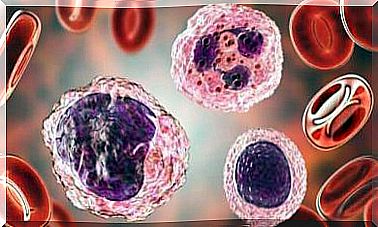Numbness Of The Hands: Why Does It Occur?

Numbness in the hands is a fairly common and somewhat unpleasant sensation. The affected area of the body stiffens or loses flexibility. It is also often accompanied by tingling.
It is a common cause of medical consultation, but it can be complex to make a correct diagnosis. In this article we explain everything there is to know about numbness in the hands and the most typical etiology.
What is numbness of the hands?
Numbness in the hands is an alteration of the sensation and movement of this part of the body. The sense of touch is impaired and it is difficult to move the fingers.
In some cases, in addition to tingling, there are burning and tingling of the skin. Depending on the cause, it can occur only in the fingers, in a single limb, or in both. For example, one of the reasons for numbness in the hands is cold, which is quite common and generally has no consequences.
According to a study in Sweden, however, the most common cause is carpal tunnel syndrome. This research explains that 1 in 5 people with numbness probably never have carpal tunnel syndrome.

Causes of numbness of the hands
Numbness in the hands can be caused by a multitude of situations. For example, it can appear due to a lesion of the nerves (subjected to compression or injuries) present in the upper limb or from systemic diseases to the same.
It is also possible that the alteration resides in the brain or spinal cord, the two organs that coordinate sensitivity and motor skills. The injuries in these cases are more severe and associated with obvious or disabling symptoms.
Metabolic and infectious diseases, as well as some medical treatments, can also cause this condition. In the following sections we will explain the main causes of the problem in more detail.
Disorders affecting the brain and nervous system
Any pathology affecting an area of the nervous system related to the hands can cause numbness in the hands. For example, Guillain-Barré syndrome, a disorder in which the immune system attacks nerve cells.
According to another study, numbness in the hands is one of the diagnostic symptoms of Guillain-Barré syndrome, but also cervical spondylosis, which causes wear on the intervertebral discs, from where the nerves that go to the extremities start.
Trauma or overuse injuries
In this category we find the carpal tunnel syndrome that we reported at the beginning. It is a condition in which the median nerve, which radiates from the forearm to the fingers, is compressed. This causes wrist pain, numbness, cramps and tingling.
Although this syndrome is the main cause of numbness in the hands, other syndromes or injuries can sometimes be present. For example, cubital tunnel syndrome, where the pinched nerve is another. The same is true for brachial plexus injuries, such as after an accident.
Consequently, the final mechanism ends in a common path, namely the compression or crushing of the affected nerves. Later, the brain misinterprets signals from compressed neurons and sends indications of tingling, pain, and even paralysis in the hands.
Infectious diseases that cause numbness in the hands
For example, Lyme disease is an infection caused by the bite of certain ticks. According to the Centers for Disease Control and Prevention, numbness in the hands is a common condition when proper treatment is not implemented promptly.
Another infectious disease that can cause this symptom is syphilis. In this case too, the same argument applies to the previous disease. When treatment is delayed, it causes nerve damage due to the course of symptoms.
Chronic ailments
Some diseases end up damaging the nerves over time. As a consequence, the end result is an alteration in sensitivity and motor skills. For example, diabetes is one of the most important and frequent. It actually produces so-called diabetic neuropathy which, according to the University of California, is associated with numbness in the hands.
Alcohol consumption, amyloidosis, and multiple sclerosis are also chronic conditions affecting the upper limbs. While it is true that cancer itself is not the most common cause of this symptom, chemotherapy treatment involves a combination of drugs with this adverse effect.

Other possible causes of numbness in the hands
Another possible cause is the presence of a cyst. These are dense clusters of fluid that often appear in the joints, for example in the wrist. If it grows or presses on a nearby nerve, it will cause this effect.
On the other hand, vasculitis reduces the blood supply to the palm and fingers. It is, in fact, the inflammation of the walls of the arteries that thins them. Following the reduction of oxygen to the tissues, they react through some symptoms such as numbness.
When to see a doctor?
If you notice numbness in your hands, it is imperative to consult your doctor. The practitioner should perform a physical exam and related complementary tests to arrive at a diagnosis.
As we have seen, the causes are varied, so it may not be possible to make a clear diagnosis at first. Several tests will be needed to understand which disorder causes this symptom. In any case, you have to stay calm, because most of the time these are solvable causes.









